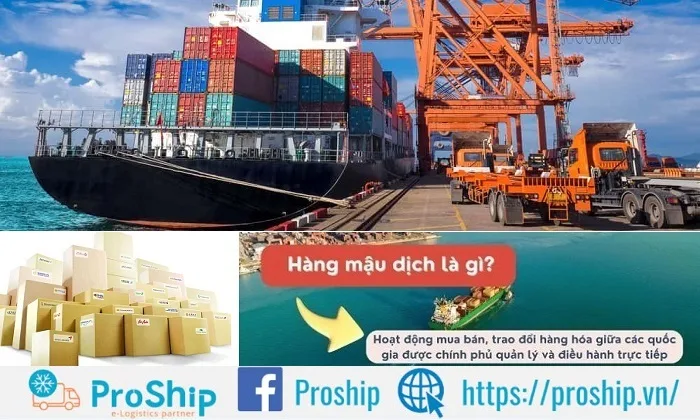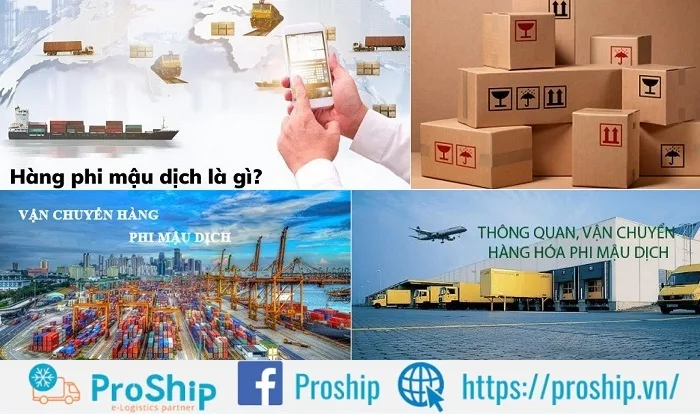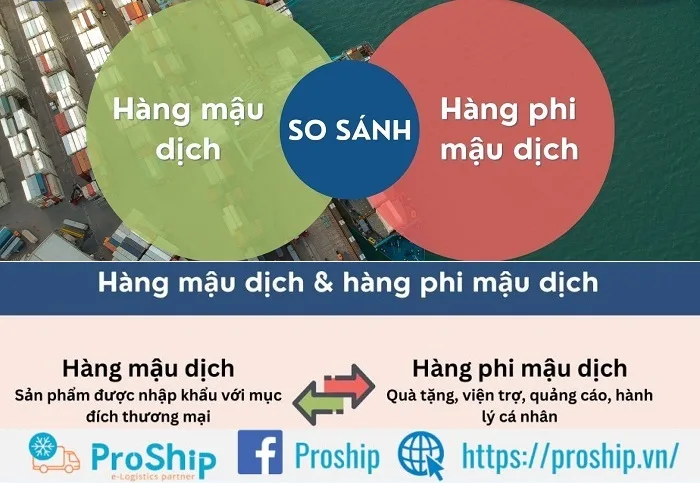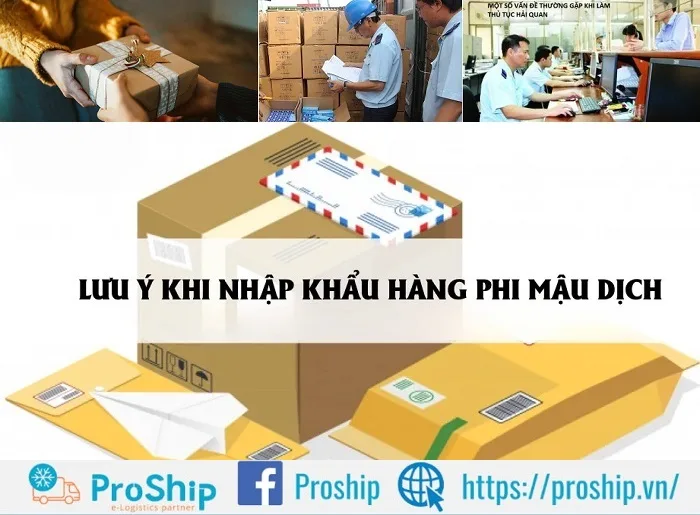x Các tư nhân, doanh nghiệp mới tham gia vào hoạt động thương mại, giao thương quốc tế, XNK hàng hóa còn mơ hồ về khái niệm hàng mậu dịch và phi mậu dịch?
x Bạn thắc mắc làm sao nhận biết là hàng mậu dịch và hàng phi mậu dịch?
x Bạn chưa biết địa điểm làm thủ tục hải quan cho hàng XNK mậu dịch và phi mậu dịch ở đâu?
Proship.vn chúng tôi sẽ giúp bạn làm rõ khái niệm hàng hóa mậu dịch là gì? hàng phi mậu dịch là gì? Cùng với đó là cách nhận biết chính xác về hai loại hàng mậu dịch và phi mậu dịch thông dụng này trong hoạt động xuất nhập khẩu.
Hàng mậu dịch và phi mậu dịch nghĩa là gì?
Hàng mậu dịch và phi mậu dịch là gì? Hàng mậu dịch và phi mậu dịch là thuật ngữ trong lĩnh vực kinh doanh quốc tế, đặc biệt là trong lĩnh vực xuất nhập khẩu và thương mại quốc tế.
Khái niệm hàng mậu dịch
Hàng hóa mậu dịch là gì? Hàng mậu dịch (Commercial Goods) là hàng hóa có hợp đồng mua bán và số lượng xuất nhập khẩu không bị giới hạn. Các doanh nghiệp thường nhập hàng hóa mậu dịch về nhằm mục đích sản xuất kinh doanh tăng lợi nhuận.
Khi nhập hàng mậu dịch, doanh nghiệp phải chịu trách nhiệm trước pháp luật về chất lượng và tính chất hàng hóa. Khi giao dịch được xác nhận, bên cơ quan hải quan sẽ xuất hóa đơn và đóng thuế.

Nhìn chung, hàng mậu dịch được công nhận là mặt hàng xuất nhập khẩu chính ngạch. Các doanh nghiệp KHÔNG NÊN nhập khẩu hàng mậu dịch theo hình thức tiểu ngạch không hoá đơn, chứng từ gây nhiều hệ lụy trong kinh doanh.
* Ví dụ hàng mậu dịch: Máy phát điện nhập khẩu để bán tại thị trường Việt Nam.
Khái niệm hàng phi mậu dịch
Hàng phi mậu dịch là gì? Hàng phi mậu dịch (Non – Commercial Goods) là hàng mẫu, hàng biếu tặng, hàng khuyến mãi. Các mặt hàng phi mậu dịch sẽ không phải chịu bất kỳ chi phí gì khi sử dụng.

Các loại hàng phi mậu dịch là hàng nhập khẩu không có mục đích thương mại và không thuộc những danh mục hàng cấm nhập khẩu theo quy định của các Cơ quan quản lý chuyên ngành xuất nhập khẩu.
* Ví dụ hàng phi mậu dịch: Máy phát điện là quà tặng từ đối tác nước ngoài cho một doanh nghiệp Việt Nam.
>>Xem thêm: CO CQ là gì?
So sánh hàng mậu dịch và hàng phi mậu dịch
Điểm giống nhau giữa hàng mậu dịch, phi mậu dịch
Điểm giống nhau giữa hàng hóa mậu dịch và hàng phi mậu dịch là gì?
- Hàng mậu dịch và phi mậu dịch đều phải trả các khoản phí quốc tế theo quy định và thuế GTGT (VAT) cho Nhà nước;
- Hàng mậu dịch và phi mậu dịch đều phải kèm theo hóa đơn (phí quốc tế, phí vận chuyển,…) để Cơ quan có thẩm quyền có thể kiểm soát được giá trị và kiểm định tính chính xác của hàng hóa.

Điểm khác nhau giữa hàng mậu dịch, phi mậu dịch
Bảng tổng hợp sau sẽ giúp bạn hiểu rõ điểm khác nhau giữa hàng mậu dịch và phi mậu dịch là gì:
| TIÊU CHÍ | HÀNG MẬU DỊCH | HÀNG PHI MẬU DỊCH |
| Mục đích | Nhằm mục đích thương mại, mua bán, trao đổi để thu lợi nhuận. | Không nhằm mục đích thương mại, thường là hàng mẫu, quà tặng, hàng viện trợ, hàng trưng bày, hàng gửi sửa chữa… |
| Thủ tục hải quan | Phải thực hiện các thủ tục hải quan theo quy định, bao gồm khai báo, nộp thuế, kiểm tra hàng hóa… | Thủ tục hải quan đơn giản hơn, thường không phải nộp thuế nhập khẩu, nhưng vẫn phải khai báo và có thể bị kiểm tra. |
| Chứng từ | Cần có chứng từ như hợp đồng mua bán, hóa đơn thương mại, vận đơn, giấy chứng nhận xuất xứ (C/O)… | Chứng từ đơn giản hơn, có thể chỉ cần giấy tờ chứng minh tính chất phi mậu dịch của hàng hóa. |
| Thời gian thông quan | Thường mất nhiều thời gian hơn do phải thực hiện đủ các thủ tục hải quan. | Thời gian thông quan nhanh hơn do thủ tục đơn giản. |
| Giá trị hàng hóa | Có giá trị thương mại, được tính thuế dựa trên giá trị khai báo. | Không có giá trị thương mại, không tính thuế nhập khẩu. |
Địa điểm làm thủ tục hải quan cho hàng mậu dịch, hàng phi mậu dịch ở đâu?
Nhiều doanh nghiệp thắc mắc về các quy định khi làm thủ tục xuất nhập khẩu cho việc nhập hàng phi mậu dịch là gì và hàng mậu dịch ở đâu?
Theo quy định Điều 19 – Thông tư 38/2015/TT/BTC, địa điểm đăng ký tờ khai hải quan cho hàng mậu dịch và hàng phi mậu dịch quy định cụ thể như sau:
1. Đối với hàng xuất khẩu, cá nhân/tổ chức có thể đăng ký tờ khai tại một trong ba địa điểm sau:
- Chi cục Hải quan tại địa phương doanh nghiệp có trụ sở hoặc nơi sản xuất;
- Chi cục Hải quan tại địa phương nơi tập kết hàng hóa xuất khẩu;
- Chi cục Hải quan tại địa điểm cửa khẩu xuất hàng.
2. Đối với hàng nhập khẩu, cá nhân/tổ chức có thể đăng ký tờ khai tại một trong hai địa điểm sau:
- Trụ sở của Chi cục Hải quan tại cửa khẩu nơi quản lý địa điểm lưu giữ hàng hóa, cảng đích được ghi trên vận tải đơn hoặc hợp đồng vận chuyển;
- Chi cục Hải quan tại địa phương ngoài cửa khẩu nơi doanh nghiệp có trụ sở hoặc nơi hàng hóa được chuyển đến.
3. Đối với các loại hình cụ thể của hàng xuất nhập khẩu, địa điểm đăng ký tờ khai được áp dụng theo quy định của Nghị định số 08/2015/NĐ-CP.
Lưu ý cần biết khi nhập khẩu hàng phi mậu dịch
Khi tiến hành làm thủ tục nhập khẩu hàng phi mậu dịch có những lưu ý sau:
1. Hàng phi mậu dịch cũng phải đóng thuế nhập khẩu. Nếu mặt hàng trị giá dưới 1,000,000 VNĐ, không phải đóng thuế.
2. Hàng phi mậu dịch được hưởng thuế ưu đãi nếu có C/O (chứng nhận xuất xứ).
3. Thuế GTGT nhập khẩu hàng phi mậu dịch không được khấu trừ. Thuế này được đưa vào chi phí khác trong hồ sơ khai báo thuế.

4. Hàng phi mậu dịch có thể bán ra dưới dạng thanh lý tài sản. Ghi nhận doanh thu khác cho doanh nghiệp.
5. Hàng phi mậu dịch có thể là hàng thanh toán hoặc không thanh toán qua ngân hàng. (Ví dụ: thanh toán hàng mẫu; hàng viện trợ nhân đạo thì không thanh toán).
6. Hàng phi mậu dịch đa phần là không phải kiểm tra chuyên ngành hay làm các chứng nhận hợp chuẩn hợp quy hoặc công bố sản phẩm.
Hàng phi mậu dịch là gì và hàng hóa mậu dịch là gì, cách nhận biết hàng mậu dịch và phi mậu dịch là gì đã được chỉ ra. Song song đó, Proship cũng gợi ý các địa điểm làm thủ tục hải quan cho hàng mậu dịch và hàng phi mậu dịch. Doanh nghiệp XNK nên tham khảo và liên hệ 0909 344 247 để được tư vấn về các loại hình dịch vụ vận tải Đa phương thức giá rẻ.

